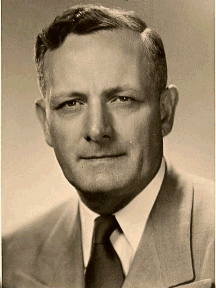 1893-1963
1893-1963
Born in 1893 near Cedar Rapids, Nebraska, Bob moved with his family to Santa Rosa, California, in 1902. He graduated from UC Berkeley with "Big C" athletic awards in basketball, football, and track. He came to Davis to attend the University Farm as required by his major. In 1916 he was selected to be Picnic Day Chairman. Because Bob was not one of the "rich guys" who had horses to ride out to the fields, he and his roommate built and rode the first bicycle used on campus.
Bob served in the artillery during World War I. In 1918 he moved to Woodland to become manager of the Conaway Ranch, then considered a model of California agriculture. He and his partner, Babe Slater, also of UCD, made a local legend by turning a Model T truck around on a narrow levee road simply by lifting the front end off the ground and carrying the vehicle around.
In 1920 Bob married Edith C. Horstmann and shortly thereafter purchased his own farm. While raising sheep, hogs, and feed on this land, he was often asked to appraise farm land by the Bank of Italy. In 1932 he moved to San Francisco to join the bank's agricultural loan department and began his career in developing loan practices. Bob was known as "the farmer's best friend" in the bank. As a farmer himself he knew what was required for a successful farming venture. He could, and often did, ride horses, pitch hay, and move livestock while talking to the farmers who were his clients.
Always a great supporter of UCD, Bob worked with Judge P.J. Shields and others in the 1920's to make Davis a full campus of the University. He believed that the professors and their research were the real stars of the development of agriculture in California. He promoted FFA and 4-H Clubs in California and was a supporter of both the California Cattlemen's Association and the Wool Growers Association. He rarely missed a Picnic Day.
Bob's genial and happy manner and his broad knowledge of agriculture made him a welcome guest on many farms throughout California. During his banking years he often said the criteria for loans were the three "C"'s - capital, collateral, and, most important, character. He firmly believed it was the amazing character of the California farmer that made him the finest in the world.
